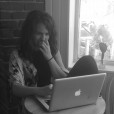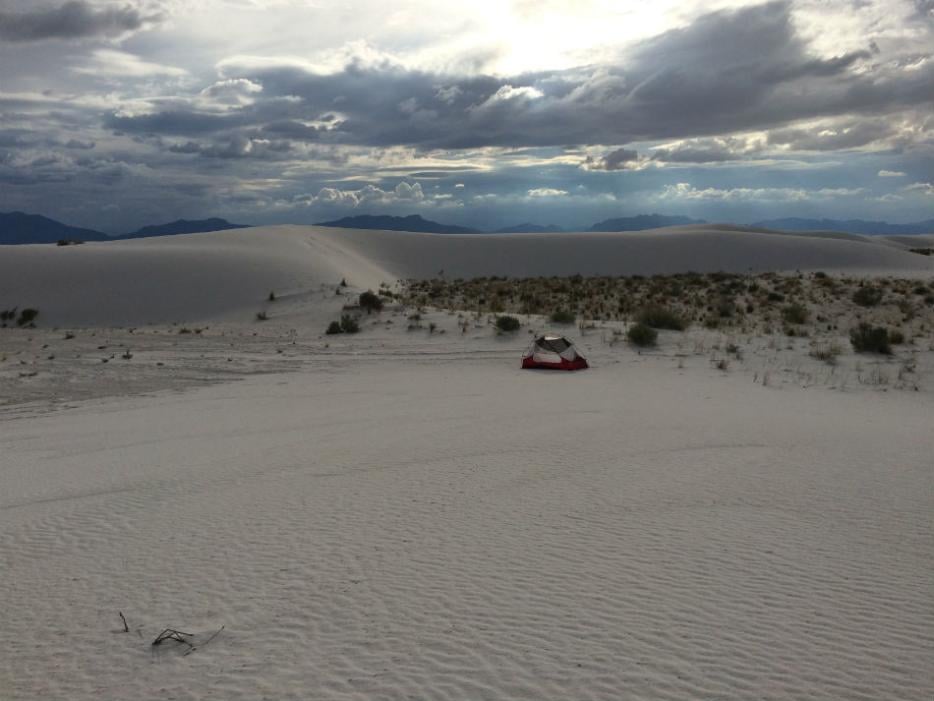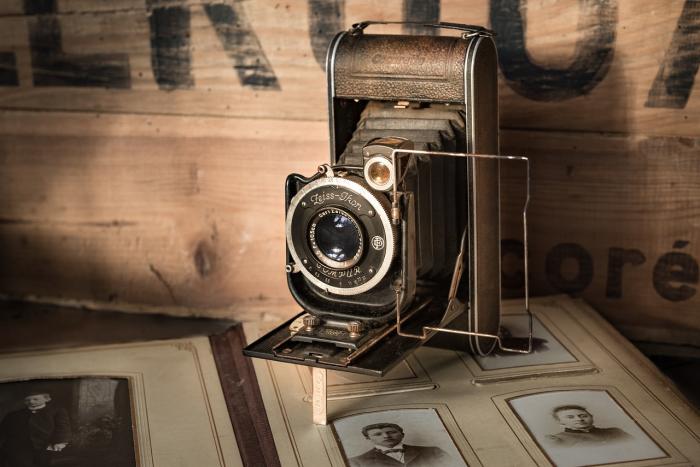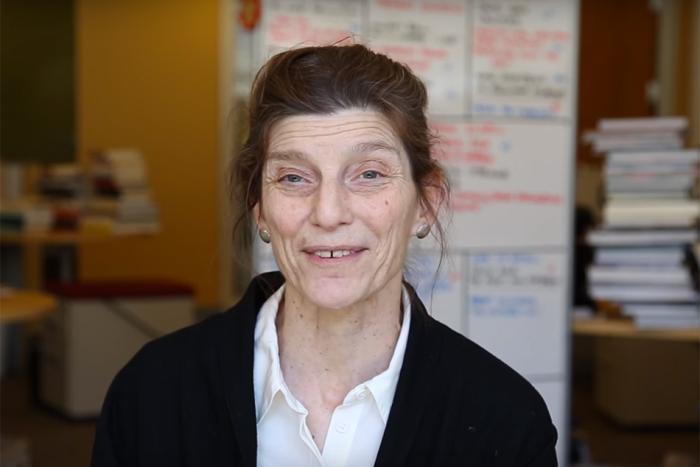Survival Skills is a monthly column about nature and feelings.
“You should limit the number of times you act against your nature, like sleeping with people you hate. It’s interesting to test your capabilities for a while but too much will cause damage.”
- Jenny Holzer
It's hard to know what to do when someone says, “this is the knife I was going to use to kill you.” On a cold day in January, he holds a box cutter up to my face, runs it in front of my neck, his expression placid as flat water, and then walks calmly back over to a cardboard box that sits on the other side of the room waiting to be sliced open.
It’s hard to know what to do when that same person, later, says he loves you.
It wasn’t the first time I’d felt scared. It started when we began to watch Luther, a British crime show about a dashing detective. Once, late at night, after an episode, he turned to me in bed and asked if I’d ever thought about killing someone. I hadn’t. Had he? He had. He’d want to know if he could get away with it, he said. We turned out the light, and I couldn’t sleep.
Soon after, he decided to purchase The Psychopath Test by Jon Ronson. He wanted to know if he met the criteria. Then the conversations shifted from killing someone to killing me. I can’t recall the jokes exactly now—it’s been too long—but he made jokes about it. I know there were three, because I told myself that one or two jokes about him killing me might be okay. But there were three, and so I told him I was uncomfortable with this running joke of his, expecting something like a rational response.
He got angry. The problem, he said, was that I wasn’t funny enough. I didn’t get it.
Somehow, we talked around it until I felt less perturbed. Later that evening, back at my own apartment, I called a friend and asked out loud the question I’d been wondering for the last little while: “How do you know if you’re being abused?” Abuse is a fraught word, heavy and dangerous, and it’s a charge that, these days, you'd better be ready to defend. I knew once I’d said it to another human, I wouldn’t be able to take it back. I knew if I had to ask I already knew the answer.
And then he was holding a box cutter up to my face. My brain was pounding like a fist was curling around it and squeezing tight. I had one job: to get us down the stairs and outside. I held my breath as though if I exhaled even slightly, the carbon dioxide might send the situation in an entirely different direction. Five minutes later, we were walking down the street. Nobody who passed us would have noticed anything wrong.
For women who are raised to believe they are strong, agency is complex. Privilege makes you reckless. I remember the moment I chose to buy into the interesting situation I could sense unfolding. It happened one morning, maybe around 4 a.m., when I couldn’t sleep—I usually couldn’t sleep when I slept over. We almost always went to bed angry and I almost never knew why. There is something insidious about love built by two brittle hearts. I made a choice and chose wrong. How naive I was, to have thought that when someone hurts you, the polite response is to ask him to stop.
*
"I'm just here to see the desert."
The cab driver had eyed me curiously as I slid across the back seat, and asked if I was walking across the country. "I once picked up a guy with a backpack like yours—he was walking from California all the way to Canada."
Honestly, I didn't really know where I was going. I'd come for the heat, the sand, the air so dry and thick it wraps it around you like a blanket. I'd grown up around mountains; mountains are where you go to fight. But the desert was where you went to surrender.
The driver dropped me off at a cheap motel and, standing on the balcony across from a Waffle House, I was struck by how velvety blue the sky looked against the white stucco walls, how most of the buildings were some faded shade of orange, humming with fire in the quiet night.
Inside, I ran a bath. I stepped into in the water, so hot I could feel my skin burning, shoots of pain crackling up my ankles and calves. It felt good to get hurt.
*
At the beginning, we were tender and careful. He was handsome, with a crooked smile that erupted onto his face, a dry wit that made him charming. (Even now, after everything, I think of that smile and feel a little bit slayed.) One night, he recited John Donne to me as we walked home. I didn’t laugh often but, when I did, I laughed hard. To call it a relationship would be wildly inaccurate, but our entanglement lasted for a handful of months. We went on two dates. I remember distinctly when the tone turned. I stood in front of his bathroom mirror, teasingly threatening to splash water on the side of the sink he kept meticulously clean. “You whore!” he screamed.
As time went on, on any given day, I was a bitch, a fucking asshole, or not conventionally attractive. I had a fat ass; I was unkind, not supportive enough, cruel, lacking a backbone. I looked like shit, my vagina smelled bad—so bad that he could smell it through a pair of running tights I owned. Once, there was a joke that someone, somewhere, someday would be desperate enough to marry me—that one stung.
I developed an anxiety disorder. I couldn't eat or sleep. I lost fifteen pounds and didn't notice until my coworkers told me I was looking fit; my body literally eating itself to keep warm. I shook when I tried to sleep. I began to cry at things that weren't sad. I kept a knife under my pillow. One night he came over and found it, pulled it out of its sheath, switched open the blade and stared at it. You know, he said, that statistically it’s far more likely that a perpetrator will use your own weapon against you. You know that, right? He didn’t come over again.
After the incident with the box cutter, he called me one night in what I can only describe as distress. I was concerned. I did not know what to do. I went to his house. (I should not have gone to his house.) I found him on the bathroom floor, bleeding, crying. I stayed until he calmed, grabbing his wrists, hugging his knees, watching him break. He asked if I would come to his funeral. I said yes. I slept over. I did not know until the next morning that it was physically possible to wake up in tears. I’d slept alone in an apartment with someone who had threatened to kill me.
Soon after we ended things, in a bewildering public conversation in which he cried, pleaded, professed love, I became obsessed with watching shows about serial killers, as many as I could find, my new nighttime routine. Sleep would find me around 4 a.m. as the killer quartered yet another female victim. I didn’t turn the lights off anymore—I always ended up flicking them back on. My natural state of mild excitement was replaced by an electric unease. I was still picking up the phone when he called, indulging the part of me that liked being needed. A month after what I’d taken to calling the incident, that morning in the apartment with the cardboard box and me, I was admitted to the psych ward after an uncontrollable panic attack brought on by another nonsensical argument between us. They took away my phone, my ID, my keys. They told me to stop speaking to him. That if he was self-harming, I call the police. That if he harmed me, I call the police. That month is the closest I have ever come to losing my mind.
*
Stay. I flip the word around in my head, listen to it fall off my tongue. To cease going forward, to come to a halt. To support, prop, or brace. To remain in place. Alexandra Molotkow writes in New York magazine,“cruelty is intimate, and can feel, perversely, like a form of care: You have to know someone to know how to hurt them, and to want to hurt someone demonstrates interest.” Why does anyone stay? Why did I? I have been playing with this question for months, like it’s some kind of Rubik’s Cube from hell I can’t solve and I can’t put down.
And still, I know I am lucky: I am the best-case scenario. He never hit me, never raped me; just once, when we were in our pajamas roughhousing, he held me down on his bed, pinned my wrists, and it wasn't playful anymore, his face changed and I saw it change and he knew I saw and, after a little too long, he let go. That hardening in someone's eyes is not something you can quantify. Their hands leave red rings around your wrists that fade before you can use them as proof. I see a therapist who says, "you care so much about being a good person" like it's a bad thing. But I realize that it's here where romantic hope gets twisted into something more sinister. That burst of excitement in your chest that rises like soft fireworks and sounds a little like someone whispering “maybe you can save me, maybe it’s you,” is something that, if you're not careful, will detonate. When friends ask why it's been so long since I've been in touch, I shrug. There's been a lot going on. Someone tells me that maybe I should pray about it. Someone else says, but he never hurt you, right?
Asking why I stayed means learning things about myself, about loneliness and desperation and how I fit or don’t fit into the world. There are times in my life I’ve felt so passive, so apathetic, like nothing more than a mouldy leaf floundering in a parking lot in front of a 7-Eleven at night, tossed around by whatever breeze comes along. And this was one of those.
*
The desert is a place of absorption. No water is wasted here, sucked into the cracks that run like spindly veins through the bleached rock. It’s alien, the landscape in New Mexico. One minute I’m driving along the interstate in my silver Hyundai rental, brown sand pockmarked with black cacti as far as I can see, and the next everything turns to blindingly bright white gypsum hills. I pull up to the White Sands National Monument and ask for a backcountry campsite and the blonde woman behind the desk charges me $3. Good deal. She’s mildly distracted, and asks me if I have a cell phone I can use to call 911 if I need to and I say yes. (I don’t.) But I've dealt with bear scares and have camped in 20-below and there aren't even any animals here, what could I possibly have to fear? I've got tons of water. Besides, I think to myself, I’ve never cared less about whether I survive. Then she hands me the pamphlet with the pictures of the bombs.
White Sands borders a missile range of the same name and, I quickly learn, is a hundred feet from the testing ground where they set off the first atomic bomb. Because it’s still a live test site, detritus can get blown too far and, even years later, turn up somewhere in the dunes still ready to explode. Camping with bombs is new even for me but I’m not deterred. I take my permit, drive up the dune road, and hike the two miles out to my site. I see a couple of people far in the distance but otherwise it feels like I’m alone in space—exactly what I came for. Here, white dunes roll in every direction, emitting a blue glow that rises, fuzzy, like an old TV screen left on downstairs. I’ve been walking for half an hour and I can feel my skin burning from the sun.
I pitch my tent. When it starts to get dark, the wind picks up. Out here on the dunes, there’s no shelter. Even if you’re tucked in to one of the valleys in between, which I am, you’re totally exposed. It’s just me and the little black beetles that find my tent fascinating and my presence nothing more than an irritating obstacle between them and refuge. Suddenly, the wind begins to whip the nylon so violently that even the weight of my backpack can’t keep it pinned to the sand. I climb in as thunder rips across the flat sky.
I count to five or six—or was it seven?—between the lightning strikes and the thunder. And, suddenly, I remember the warden telling me that there’s one real danger out on the sand, aside from the bombs, and it’s lightning storms. I don’t know anything about lightning safety—I don’t climb high-altitude mountains or live in a place where such knowledge would be useful. When the thunder crashes again, I can feel panic pricking around my spine. I’m not the highest thing out here, but I am carrying the most metal. I look around at my tent poles (metal), my stove (metal), and my fuel canister (metal and explosive). In the brochure I stuffed in my backpack, it says that if there’s lighting, head back to your car. But I’m too far out to make it back before pitch-dark sets in and I know if I try I’ll lose the trail. I decide to try anyway, frantically packing up my things, amazed my tent hasn’t been shredded. The lighting strikes continue, the most spectacular thing I’ve ever seen, roasting these pure white dunes. I throw my arms up, wrapping them around my head as though that will offer some kind of reprieve, and I think it is actually conceivable that I could die in the middle of the New Mexico desert.
I begin to walk in the rain, and about half a mile back to my car I see a hooded figure struggling to pull a fly over a tent. I realize I have lost the trail but also that, thankfully, I am not alone. When I get closer I see that it is a lanky man around my age. Truthfully, he looks a bit like he's been electrocuted already, wide eyes and wild curly hair. I explain that I am freaked out by the lightning and he nods. We both know it is bad to be out here. Back to the car would mean walking half an hour on top of the dunes. Staying would mean hoping I was protected enough to be lucky, or lucky enough to be protected. It starts to pour and the lightning keeps filling the cracks between the clouds.
A man I can fight. Against lightning, I am nothing. He offers me a corner of his four-person tent to sleep in, which is nice. His presence out here is comforting. I don’t know how long it rained for—it is still raining when I fall asleep, which feels like hours.
I wake up to see the sunrise at 6 a.m., and it is like the wild night hasn’t happened at all. The dunes are still glowing, rippling, pristine. Beads of sweat pool on my legs as I stuff my sleeping bag into my backpack and the man comes over with a towel, starts to rub me down. I recoil. I hadn’t wanted this. I hadn’t invited it, or said yes. Even out here, even when all I need is help.
Later, a friend tells me that tent poles don’t conduct electricity. And I’m reminded that, so often, the worst monsters are the ones that live in our heads.
*
A few days later, I’m in Truth or Consequences, New Mexico. The downtown strip is dotted with spas, hot springs, shops hawking healing crystals and therapies that will infuse your life with the zen you know it deserves. The small, burnt-out town is the spa capital of the United States, on the banks of the Rio Grande River. I am in one of its bathhouses, submerging myself in kitsch and crumpled dreams. I survey the crumbling tiles, the placid water, the salt-and-pepper pebbles covering the pool's floor. I undress and step in carefully. I wonder how many other butts have sat on this very stone hoping for some kind of revelation. I stop being able to breathe and climb out for relief. And then I get back in.
I wonder if I will always approach the men I date with a feeling deeper than apprehension now, a feeling closer to fear. Love is something to be guarded. No one tells you that the most complicated part isn’t moving on, it’s starting over. I didn’t know until I found myself in the what-happens-next that I would question everything with a ferocity that surprised even the most anxious parts of me, that suspicion would swallow my innards with frightening totality. I think, on average, once every minute, about whether I am smart or pretty or skinny or compelling or captivating or charming enough—1,440 times a day. I am infected. Who is the arbiter of enough, anyway?
I meet someone else, eventually, and the first time he says he loves me, I flinch. I didn't believe much before and I sure don't believe anything now. The first time I have sex again and it feels good, I go to the bathroom and sob. One thing my therapist never told me to expect is that I’d forget when I know how much is too much to give; I can no longer tell when the equilibrium is off. Everything now—a flicker of tone, a sideways glance, a distant voice on the end of the phone—is a sign, a flag, a warning.
Back in a rundown bathhouse on the banks of a river deep in the desert, I sink my face into the pool and lie back, hoping I'll float and I do, for a time. My hour is up. The water is calm, and I am calmer too, soothed by the white walls and whisper-pale blue window slats, the terra-cotta floor cold on my feet. I walk up the stone stairs and pause to look into the small mirror at the top, skin flushed red from the heat. I notice an eyelash on my cheek and lift it off. I imagine my new boyfriend here, wanting him to be, cautiously, so we can play the eyelash game, press our thumbs together, spread them apart, and make a wish. Maybe, I think, our wishes would be the same.






